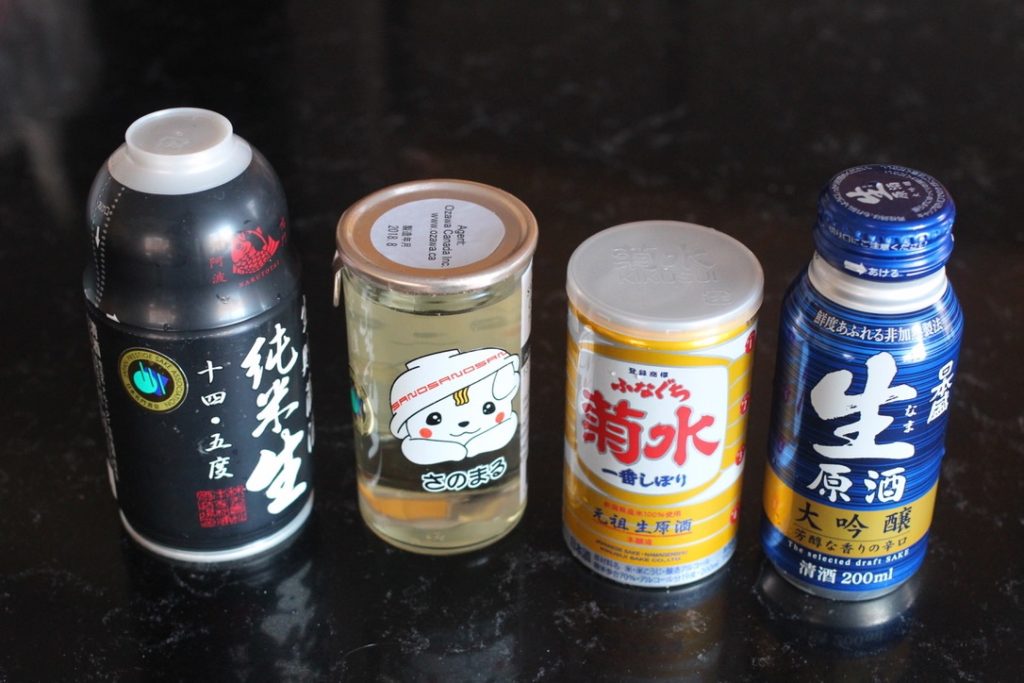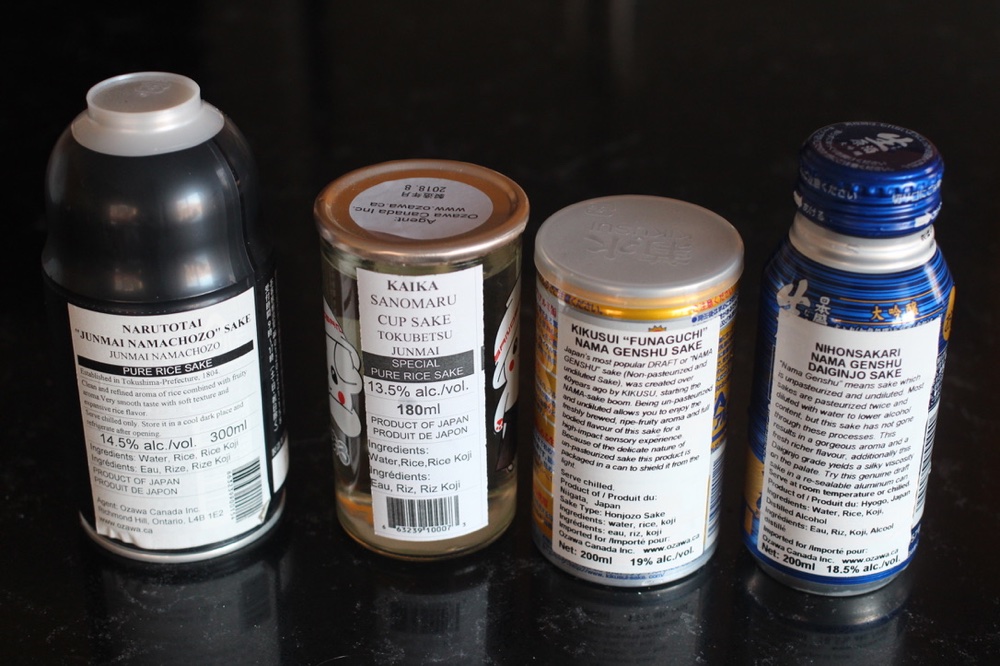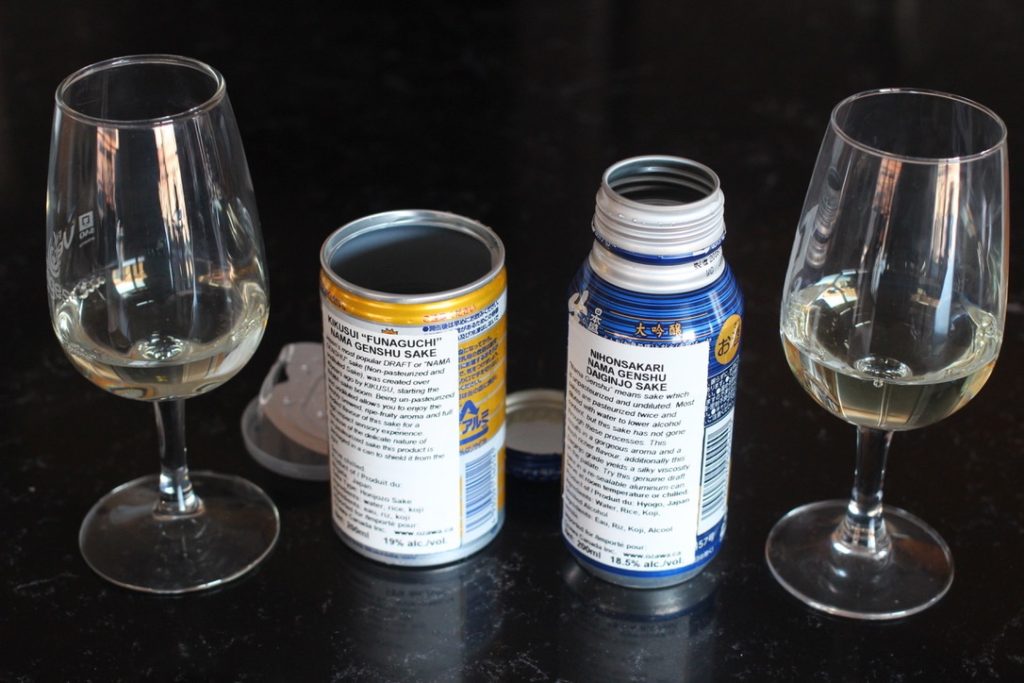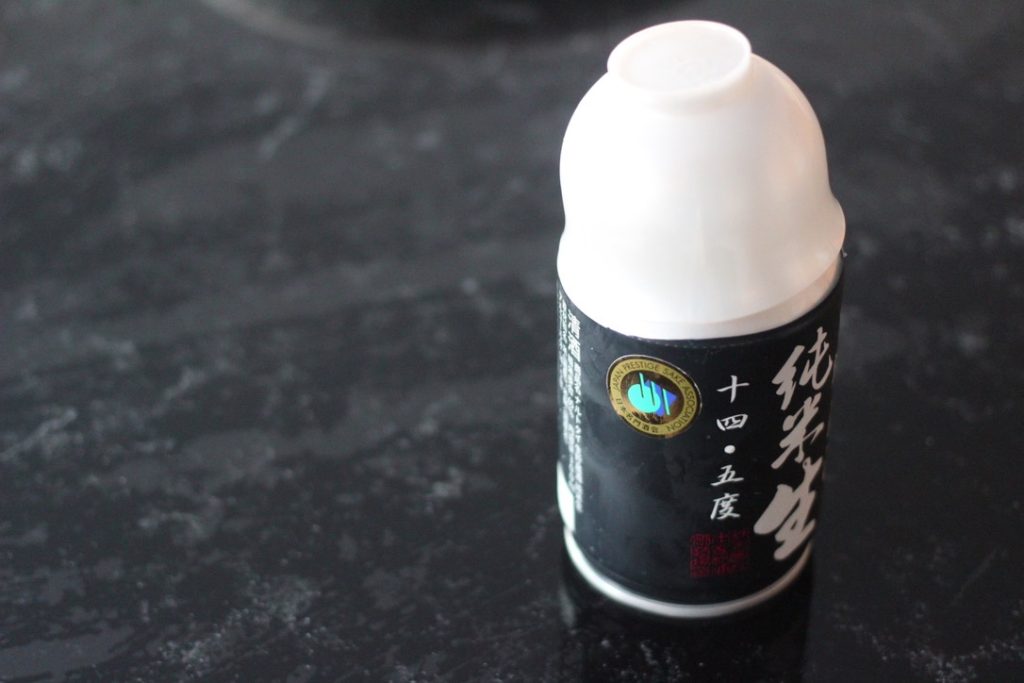
Yes, sake comes in cans. Yes, it’s pretty affordable. And yes, occasionally it’s even good. Sometimes, it’s very good.
Because, like beer, keeping unpasteurized or half-pasteurized sake in a dark, airtight container helps it stay fresher.
The trick is to find a bunch of cans in Montreal to compare them. Because right now the local selection is not amazing and what is available on the market here and in nearby Ontario is not always good.
And if you only tried, say, the one with the animal with the soup bowl on its head (see picture above; I feel as though if I were Japanese, I’d know if it was a dog or a cat), you might think it was decent, but if you compared it directly to the bottle on the left, the Narutotai, you might find the soup bowl animal wanting.
That’s why I got these four namazakes in Toronto and brought them back to Quebec (yes, it’s legal now!). I made an order through the LCBO online, got it shipped to the store closest to my brother’s apartment and then waited for an excuse to visit.
He got engaged. I booked a ticket.
What’s frustrating is that sake importers don’t have as big a market in Montreal, so there’s not much demand (yet) for these products. But there should be.
Namazake is like natural wine meets unpasteurized cheese in the form of rice alcohol. Sake is a fermented product where a big mash of cooked grain (rice) ferments over a period of time, then you strain out the mash. Most sakes are then pasteurized to kill off anything that could spoil the batch before bottling. Most sakes are even pasteurized twice: once before being bottled and once in-bottle (like when you make canned tomatoes or jam). When sake is pasteurized once, it’s called nama-cho or namachozo. When it isn’t pasteurized at all, it’s called nama-nama. Either version can be called namazake, though, or nama sake, but the ‘s’ changes to a ‘z’ when you connect them.
Why Drink Namazake?
Because it has so much flavour! You’re dealing with fermentation, so it can be a little more wild. Pasteurization kills off enzymes that provide flavours and aromas, so if you have a well-made product and those enzymes live, it can be a very different experience. Don’t get me wrong, I love the elegance of Dassai 50, but the Narutotai Junmai in the black bottle was clean and smooth and vibrant at the same time. It didn’t bite like bad sake (in or out of a can) can. Served cool (but not too cold) it was refreshing and floral and lovely. Those are not official sake tasting adjectives…
I essentially randomly picked as many namazake as I could carry home in a single bag (plus a few bottles of my favourite Bandol rosé, Chateau D’Arenc). There are more available in private import from agencies like Ozawa Canada and Metropolitan Premium Wines and Sakes, but they’re usually just available by the case.
Here’s my LCBO order:
| Kaika Sanomaru Cup Sake Tokubetsu Junmai | $8.00 |
| LCBO#: 260769 | |
| Quantity Ordered: 1 | |
| Unit Price: $8.00 | |
| $0.10 Bottle Deposit | |
| Kikusui Funaguchi Nama Genshu Ichiban Shibori Sake | $6.45 |
| LCBO#: 264555 | |
| Quantity Ordered: 1 | |
| Unit Price: $6.45 | |
| $0.10 Bottle Deposit | |
| Nihonsakari Nama Genshu Daiginjo Sake | $7.55 |
| LCBO#: 394352 | |
| Quantity Ordered: 1 | |
| Unit Price: $7.55 | |
| $0.10 Bottle Deposit | |
| Narutotai Junmai Namachozo Sake | $14.50 |
| LCBO#: 417872 | |
| Quantity Ordered: 1 | |
| Unit Price: $14.50 | |
| $0.10 Bottle Deposit |

Other common sake terms still apply to nama, as you’ll see on the labels above. The Narutotai on the left is a namachozo “Junmai,” which just means it’s made of water, koji, yeast and rice (and it’s pasteurized once, which makes it shelf-stable-ish – otherwise it’d have to be refrigerated during shipping and then kept in a fridge at the store). The two on the right are “genshu,” which means they’re undiluted, which also helps their stability (often water is added to lower the alcohol level from 17-19% to 15-16%). And “Daiginjo” means there’s a tiny bit of distilled alcohol added (to break up the mash and create new enzymes – flavours and aromas – rather than to kill off unwanted bacteria and aromas or make it more boozy).
I’m skeptical about whether these sakes actually stayed refrigerated the whole time, because they weren’t chilled when I picked them up. So maybe that animal soup bowl one had just gone off. Poor puppy?
Either way, namazake, though alcoholic, is thought to be quite healthy by some because of the beneficial bacteria – probiotics, like yogurt or raw cheese – that remain in the finished product. If you keep it out of the fridge, those bacteria will die. Hence the sad dog.
I first had a namazake in Oakland and when I spoke with the owner of the sake shop Umami Mart about nama, she got really excited, the same way wine lovers talk about raw or unpasteurized wine. That convinced me to hunt them out.
Enough background. Here’s what I thought of these namazake:



So my picks from top to bottom are:
- Narutotai Junmai Namachozo Sake – $14.50 ***
- Nihonsakari Nama Genshu Daiginjo Sake – $7.55 **
- Kikusui Funaguchi Nama Genshu Ichiban Shibori Sake – $6.45 *
- Kaika Sanomaru Cup Sake Tokubetsu Junmai – $8.00
Once the LCBO has more options and once I’m back in Toronto, I’ll be looking for more nama.
Kampai!
Leave a Reply